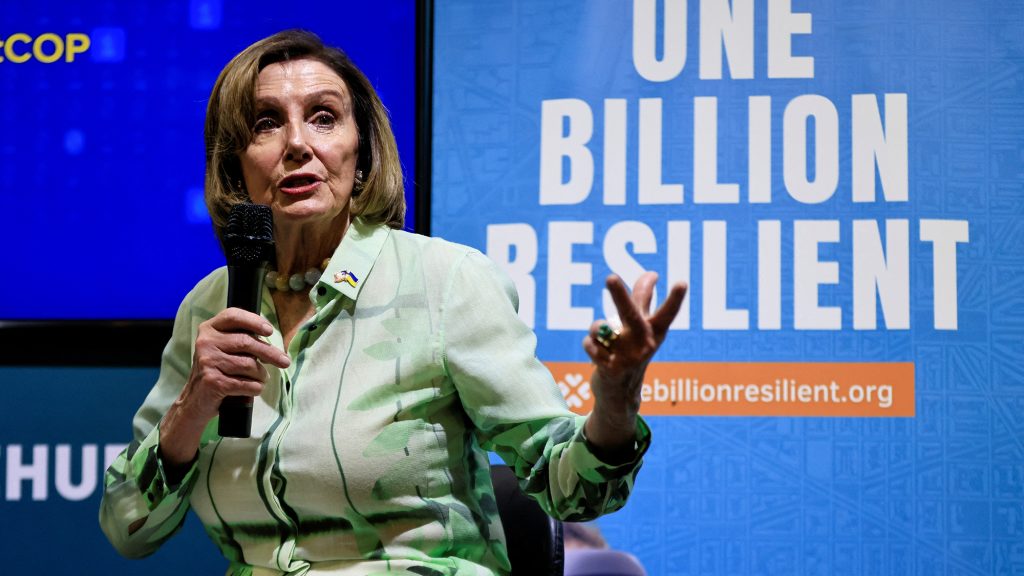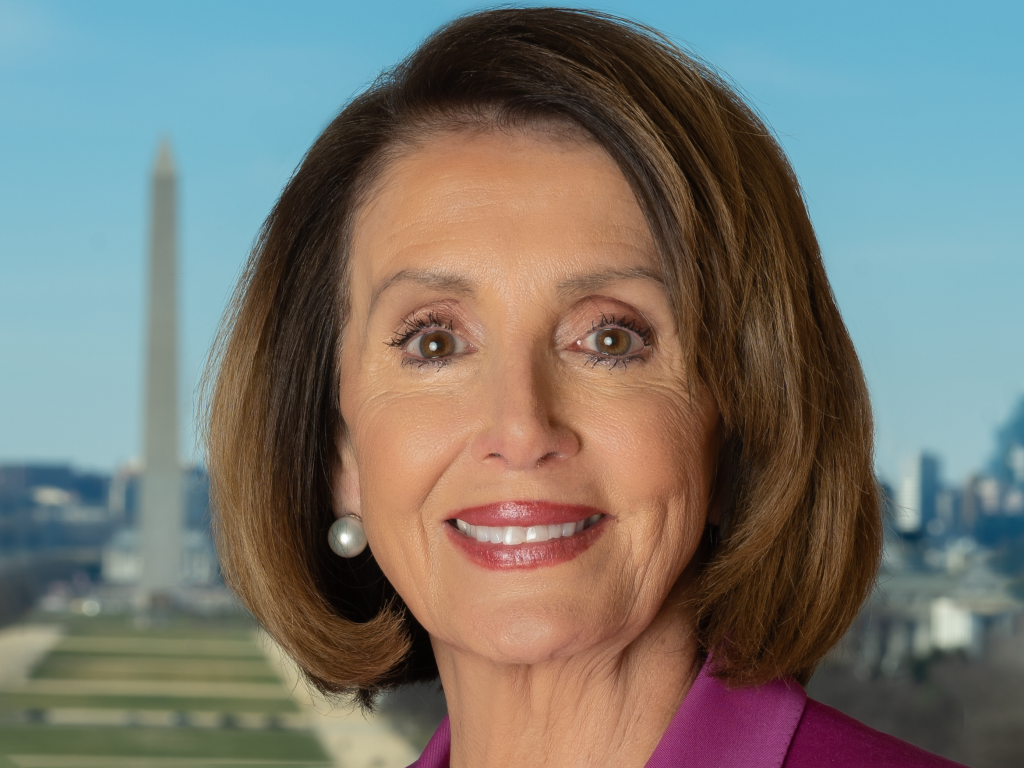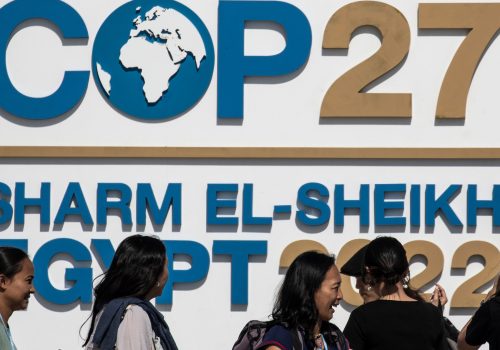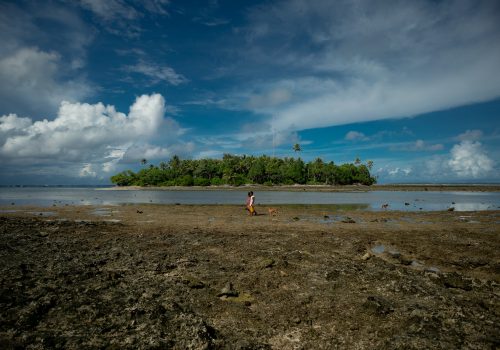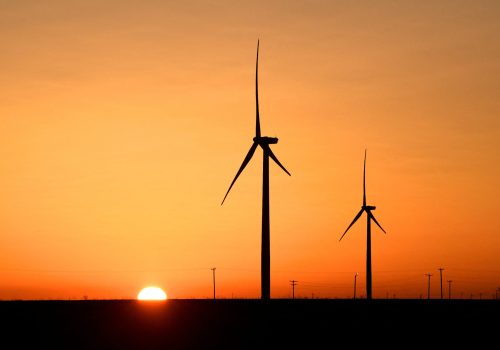Watch the full event
Event transcript
Uncorrected transcript: Check against delivery
KATHY BAUGHMAN MCLEOD: Good morning, good afternoon, good evening. I’m Kathy Baughman McLeod, director of the Adrienne Arsht-Rockefeller Foundation Resilience Center at the Atlantic Council. Welcome to the Atlantic Council’s Front Page event. We are here at the resilience hub at COP27 in Sharm el Sheikh, Egypt. I am delighted to be hosting this conversation with Speaker of the House Nancy Pelosi and Chairwoman Kathy Castor of the Select Committee on the Climate Crisis.
At Arsht-Rock, we are focused on building climate resilient for a billion people around the world. We focus on the most deadly of climate risks, extreme heat. You are feeling it right now. Let me encourage you to take your jackets off, if you can. This is the coolest we can make the room, we understand. But it is emblematic of the crisis we are facing.
Let us just get right into the conversation. We are at such an interesting time in our country and in the climate debate. We are here, seeing all sorts of challenge, suffering, loss and, at the same time, opportunities in every direction, in all of the pavilions here at the COP and beyond. The US plays a critical role in the debate, the action, the investment, as an emitter, as investment in the transition to a cleaner energy future, and to helping build resilience to climate impacts people are facing every day. When we think about the big packages of climate action, this is the very best place to have the conversation.
Speaker Pelosi, can I ask you at this critical moment, where is the US role in the energy transition, and all the turmoil we’re facing? And how do the midterm elections affect it?
NANCY PELOSI: Well, thank you, Kathy. It’s wonderful to be here with you at the Rockefeller and Adrienne Arsht Center for—and thank you for what you do in that regard, because the nonprofit sector is so important. No political agenda, just saving the planet for the children. Whatever we do is under the guidance of our distinguished chair of our Select Committee on Climate, Kathy Castor. She has been chairing the committee and listening to all of the stakeholders, whether it’s people of faith or concerned scientists, whether it’s business or labor, environment or labor or business, whether it’s farmers, whether it’s venture capitalists. You name it, every aspect to listen, so that people do not feel that they are left out or not taken into consideration.
So when you ask, what are we doing? We’re doing it in that way. And I salute Kathy for years of listening and putting together a report that was historic. And on that report, inspiring the legislation the Inflation Reduction Act, which has in it $370 billion to address the climate crisis. For the children, in a fair and just way. And Kathy will speak more about it, but I want to acknowledge three of our colleagues who are here. Mr. Meeks is the chairman of the Foreign Affairs Committee. He has been fighting and trying—and it’s a challenge; we haven’t succeeded yet—to get the global funding that we need to be good neighbors on this planet. And that is a fight that he has been making, again, part of the report from the committee.
Much of the committee—much of the committee worked on tax credits, and the chairman of the Ways and Means Committee, Richie Neal, is here, and his committee. Mike Thompson of California, under the leadership of our distinguished chairman, has the bulk of the bill. How we can come together, private sector, public sector, nonprofit sector. And Mr. Espaillat, the senior member of the Appropriations Committee from New York, he’s been—we’ve traveled to Puerto Rico after disasters, and the rest, about workforce development and how you—if you’re going to reconstruct, or transition, or have resilience, all of it, you have to have workforce to be able to do it. And so part of his contribution is that aspect of it. Other members of our delegation are Chellie Pingree as far as agriculture and the food issue. Barbara Lee roaming around here someplace, maybe will arrive, chair of the Subcommittee on Appropriations that would be funding so much of the global aspects of this.
So I really—it’s hard to speak in terms of the midterm elections and this subject, because we have had, shall we say, a disagreement on the subject. When Kathy had her bill on the floor, our colleagues said why are we having this discussion? There is no climate crisis. It’s all a hoax. We have to get over that.
I place my confidence in their children, who hopefully will teach their parents that this is urgent, long overdue. But again, how we will address it is to get working together.
Maybe Kathy would like to add to that.
KATHY CASTOR: Well, good afternoon. It’s—we come to this COP with not just talk anymore but with real concrete action out of the United States Congress, led by the most effective speaker in the history of the United States of America in Speaker Nancy Pelosi.
She has been at this—tackling the climate crisis has been her flagship issue. And many of you remember, over a decade ago she led the charge in a different Select Committee on Global Warming. And we passed in the House climate action. Unfortunately it didn’t get through the Senate. This year, finally, we delivered through the Inflation Reduction Act the most important climate bill in the history of America.
But that was the follow-on to the bipartisan infrastructure law that also doubles down on building resiliency across the country, especially vulnerable communities and frontline communities, doing more on environmental justice, doing more on the transition to the vehicles that we drive, but also significant progress in chips, in manufacturing in America, and science, because what we want folks here at this COP, want our friends across the globe, to understand is that America is ready to participate at a much higher level through science, technology, resilience, that you all—that the Atlantic Council and the Arsht-Rockefeller Center so focused on.
So this is a time of action. I know we’re talking about this COP being the implementation COP. And now, thankfully, the US is going to have the tools to implement and meet our goals of getting to net zero as quickly as possible, and no later than 2050.
KATHY BAUGHMAN MCLEOD: Thank you very much.
Speaker Pelosi, at the Aspen Ideas climate event, you said sometimes you have to take a punch for the children and sometimes you have to throw a punch for the children. What does that mean at the COP?
NANCY PELOSI: Well, I come here again—I do believe that this is God’s creation and we have a moral responsibility to be good stewards of it. So in that spirit, I would hope that we could come to our common ground for the children, for their future.
It’s a health issue in the here and now as clean air, clean water, for the children. It’s an economic issue for their families, green technology for all over the world, for everybody to participate in the new technologies economically. It’s a national-security issue. We’re told by national-security experts that the competition for habitat and resources can cause conflict. And we have to avoid that. And it is a moral issue, as we know, for the children to pass this planet on to future generations, as I believe God’s creation. If you don’t share that belief, you certainly share the belief that we have to do that for the children.
But let me just add this one thing, and that is in all of the measures that Kathy, Madam Chair, mentioned, whether it was the Inflation Reduction Act, the bipartisan infrastructure bill, where we got thirteen Republican votes, bipartisan, and all of the bills that we’ve passed—the CHIPS Act, all of that—the president and the Congress—we worked together to make sure there was justice, fairness, inclusiveness, diversity, so that—and this was sixty billion dollars in infrastructure strictly for diversity and building infrastructure that unites communities rather than divides them, but in every bill making sure there’s education and research and STEM that draws in everyone and enables everyone to participate, so that we have the best thinking wherever it springs from. So the justice piece of it is central to how we go forward for the children.
I know sometimes that I use that phrase about the punches—to quote a Republican, Teddy Roosevelt—about the arena. When you’re in the arena, you’re no longer a spectator; you’re in the arena, and I just take it to the next step. When you’re in the arena you have to take a punch, right? That’s what it is. You also have to be ready to throw a punch for the children. That’s why.
KATHY BAUGHMAN MCLEOD: I love it. I love it.
Chair Castor, I wanted to ask you about the work of the Select Committee. You have invested in immense advancements in all regard for climate and climate resilience and looking at the health effects if climate. What is the next chapter for that work, and how can that work help countries and partners all over the world?
KATHY CASTOR: Well, talk about the midterm elections, it’s quite likely—if for some reason the GOP ekes out control of the House of Representatives, they will nix the climate committee. They have not really been partners in tackling the climate crisis, and it’s inexplicable because the world’s top scientists tell us we are running out of time.
They said in the last IPCC report there is a rapidly closing window for action and that’s why we’re just so grateful that President Biden was where he was at that point in time, that the Senate—we still had control, and we’re able to finally deliver the most historic climate law in the history of American and really the world.
Now, we have a whole lot more left to do, and—but this will provide the important groundwork that we can build upon. We’re not in it alone. The private sector now has got to match the resources in our investments, and that’s why tax credits are front and center to develop the technologies on clean power—whether it’s wind or solar, the battery storage—and then, help us transfer that to the rest of the world, especially the developing world, the vulnerable nations that are going to need help because they—here in Africa, Africa wants to modernize and develop. And they can—there’s a pathway in the road where they can go the cheaper, but more dangerous and destructive—coal and gas. Or we can pivot and help provide sustainable clean energy and clean energy jobs.
So that’s why the structure of the Inflation Reduction Act and our dedication of resources to frontline communities, environmental justice communities, is an important roadmap that can be replicated as we expand technology and financing to the rest of the developing world.
KATHY BAUGHMAN MCLEOD: Thank you. Wonderful.
One of the aspects of the private sector’s involvement, we’ve heard that this is the implementation COP, and while we’re not reaching our mission’s reductions goals, that a lot of the action is taking place in the hubs, not in the government negotiations, and innovation, investment, and private sector.
Speaker, how do you think the private sector is doing? Are they playing their very best role that they can play to advance our climate goals?
NANCY PELOSI: Well, let’s hope so, but let’s make sure we shine a bright light on it. As you know, technology enables us to identify emissions. I mean, we have—knowledge is so, shall we say, enlightening, too.
But here’s the thing. It is, in my belief, in the fiduciary responsibility of the private sector to go down a green path. It is—you can’t say, well, I have a fiduciary responsibility to my shareholders so I can’t spend this money on that.
No, talk about the future. There are experts in the field who may—contend this—that you really are thinking backward, unless you’re thinking in terms of how to do this in a green way. I have so many examples of the people I encountered—both in friendship and professionally, officially, and in every way—who have said my company’s change came from my children, who just said “what are we doing”—especially when there was a family interest in the company—”what are we doing, we cannot be part of this.”
So some are because it’s the right thing to do. Some are because it’s a moneymaker and it honors their responsibility to their shareholders.
But they have to be thinking of their stakeholders, too. Not just the shareholders but the community, their employees, their customers, honoring every aspect of their purpose as they used to do.
I was raised in the mayor’s house. My father was mayor my whole life growing up in Baltimore. When I was in first grade, he became mayor. When I went away to college, he was still mayor. My brother was mayor. And the mayors are doing great work.
So I would say, as I do say sometimes to the nonprofit sector, be in touch with the mayors for what they are doing because it gets very personal as well as official—at a very personal—a very personal level.
But I don’t think that we should be contending with—I think we should be cooperating but understanding that there’s a different pace. But everybody has to know we have to pick up the pace.
I’m always telling this story, if I may, about when the private sector wasn’t so cooperative. A long time ago, I took a delegation to Alaska to see what was happening there, and, as you know, the glaciers are melting before your very eyes. You know, it’s been bad—the thermal management of the planet, so—the acidification of the ocean, the cannibalizing of the—every aspect of this right there in Alaska.
And the indigenous people there told me that thirty or forty years previous to that, so, say, forty or fifty years from now back, the elders told the scientist that something different was happening with flora and fauna and habitat, and the scientist told them that that was anecdotally interesting but scientifically insignificant.
And it bothered me so long until I realized the scientist probably worked for the oil companies. But now, of course, it’s very obvious. How many times have these communities had to move and then transition? So obvious.
But we should be paying attention to indigenous people. That was my first bill in Congress called the International Environmental Protection Act, better known as—later known as the Pelosi amendment when it was reduced to an amendment, and it was to listen to the indigenous people, not allow any American director of any multilateral development bank support an initiative unless there was an environmental assessment made and unless that assessment was made known to the indigenous people as well as globally, and that has saved many things.
So, and speaking in that regard, I want to yield to Kathy because we’ve been talking about how working with the multilateral development banks…
KATHY CASTOR: Yeah, that’s key. And you all know if you’re reading up on what’s going on behind the scenes at the COP, is empowering our multilateral banks, the development banks, the IMF, the rural bank, giving them a forward-looking mission focused on climate—on the climate crisis, just like they had a mission after the rebuilding after World War II.
And then the special envoy—the US Special Envoy John Kerry—he is now talking about an idea to bring those private dollars off the sideline from the large banks, the corporations, the hedge funds, through an emissions trading program to try to get them in the game faster because it’s all about urgency now.
We are running out of time. If we do not do this now it’s going to be a much steeper climb and then people around the world will continue to suffer these climate catastrophes and that’s why we know already warming is baked in. If we stop today, the atmosphere is full of greenhouse gases and it’s a bleak future unless we act now.
So everyone now this is the—I hope it will turn out to be the implementation COP and a COP where we are doing new and innovative things, and I hope, again, people are inspired by, finally, the United States of America passing the most historic investment in clean energy, climate change, resiliency, and climate justice in our history.
KATHY BAUGHMAN MCLEOD: Hear, hear.
NANCY PELOSI: Not one Republican vote, sadly.
KATHY BAUGHMAN MCLEOD: In terms of the urgency and the investment, we—and the Resilience Hub represents this, and the race to resilience—that we need to invest equally in adaptation and mitigation because we are now in this situation of what you described. So how will the investment packages and the legislative packages that you’ve passed—they’re the biggest ever, as you’ve said, and so historic, and have such big impact. How will we best leverage those packages for private and multilateral investment in both adaptation and mitigation? Would you like to—
NANCY PELOSI: She likes talking about it.
KATHY CASTOR: I do. You know, we’re so proud to be representing the United States of America, because we have the cutting-edge science at our disposal. But what we’ve done through the bipartisan infrastructure law, through just our plain appropriations, through the Inflation Reduction Act, is give more resources to NASA. NASA inspired the world in the 1960s to get to the moon and back. And now look at what the images coming back with the new telescope. NASA has an important role to play, not just for the US, but for the entire world. Same thing for NOAA. NOAA is the leading scientific organization gathering the data we need to build resilience, to make sure that countries around the world and people around the world know what the impacts are so that they can plan. And use—and we can devote the scarce resources we have to the most effective adaptation strategies.
NOAA, NASA, and our national laboratories are big winners, frankly, in the Inflation Reduction Act and the bipartisan infrastructure. And if the United States of America is not going to be in the lead on science and technology, who is? We’re not willing to cede that to another country. We’re not. We are the—I think after—you’d have to say, we’re the strongest—one of the strongest democracies—it was a little shaky there for a while. But we—our values tell us to use our God-given resources and the blessings of science and technology to help tackle this crisis. And that’s what we intend to do.
KATHY BAUGHMAN MCLEOD: Hear, hear. So turning to the inclusive nature and the justice aspects, 80 percent of the people displaced by climate change are women. Seventy percent of the 1.3 billion people living in conditions of poverty are women. In urban areas, 40 percent of the poorest households are headed by women. And we know that when women are empowered with resources, the entire community benefits. With all that we have on our plate, how do we continue to push for more women in leadership to solve the climate crisis, and protecting and empowering women at the short end of the stick of climate impacts?
NANCY PELOSI: When we were in—right before COVID-19, when we were in Spain, I spoke to a big women’s event there. And my biggest—I was talking about climate, but one of the lines I had, which got more attention than anything else, is: If you really want to succeed with this, you have to make a commitment globally to the education of women. It’s so central to all of this. I also think we have to have a fight against corruption in some of our, shall we say, economic systems around the world. And that will open the doors for women to be involved.
But to go back to where Kathy talked about the other bills, one of the pieces of it that is so important in our own country—and we would say as a model, again, to help others—is many things that are in there, like the child tax credit—thank you very much, Richard Neal—the child tax credit, childcare, family and medical leave, home health care that enable women to be in the game, in the workplace. Now, it’s men too who have—are caregivers, so they too. But to unleash women in that, as well as what we have in the CHIPS Act, with the increase of participation of women in science and technology and—well, we call it STEAM in San Francisco. So we have the arts in there as well.
But the role of women is—I mean, just think of the brainpower, just think of the value systems and the rest that would make—that are—that are making a big difference. But we have to have a systemic way for that to happen. And starting with the education of women, whether it’s women in the poorest situations in the world or women in the United States of America, there’s still a need to involve in a stronger way. And the president is very much committed to that.
It is—it’s very exciting. It’s very exciting. And you see so many women participating in these meetings, as well. So let’s hear it for the women. OK.
KATHY BAUGHMAN MCLEOD: And let me give a plug for the Women in Resilience reception right here tonight at 6:30. So you are all welcome. And the catering is coming.
Kathy, would you like to say a few words about that? That’s such an important topic.
KATHY CASTOR: About the reception? I’m pro-reception. No—the—well, if you do see Congresswoman Barbara Lee here this week, she has been leading the charge for international family planning and the education of girls and women across the globe. And in fact, as we developed our climate action plan in the Congress—and the charge was don’t just focus on the electricity and power sector, don’t just focus on clean cars; really do broad-based outreach. And one of the clear climate solutions is the education of young girls and family planning. Project Drawdown, if you all are familiar with that, highlighted it as I believe one of the top five climate solutions.
So, fortunately, again, here is a place where the United States of America under Democratic leadership especially has been leading the charge. And now we hope we can work with all of our allies and all countries around the globe to do better by girls and women no matter where they live.
NANCY PELOSI: In that regard, we also want them to have the opportunity to determine for themselves the size and timing of their families.
KATHY BAUGHMAN MCLEOD: Hear, hear.
So I think our time has begun to draw to a close. Any final thoughts that you would like to share with us before you go on and do good things here?
KATHY CASTOR: Well, it was about little over a month where I was boarding up my home in Tampa, Florida, as a monster storm, Hurricane Ian, was barreling towards the coast of Florida. And two weeks ago, I had an opportunity to take a Coast Guard overflight of Southwest Florida, and now here’s another late-season hurricane bearing down. So this is—this is personal for everyone now. Our hearts go out to the people of Pakistan, where over 1,700 people died in the floods. Same in Nigeria, where six hundred; the wildfires in California; everywhere.
No one is immune to the costs and the growing risks of the climate crisis. And that’s why I emphasize again: Join us in this urgent action. When you talk to people, tell them we cannot wait anymore. The time is now. We must implement. We must act. The US is in the game leading and we’re not leaving the playing field ever again.
NANCY PELOSI: Associating myself with the remarks of our distinguished chair, I would only add—and not really add, but further emphasize—that, as she has done in her magnificent way as chairman, we want to proceed with respect to not be menacing to those that we need to win over, but to show them a path and how it is in all of our interests, and that doing that we have to listen to them.
We, as the United States of America, hope, as Kathy has said earlier, that with what we’re doing technologically and all the rest, that that can be a resource to these countries as well. But our president has asked for more money for the countries for us to make—recognize that funds are needed globally. We have responsibilities. We’ve made commitments. And again, we invited your entire committee—Democrats and Republicans—but none of them came—well, unless they’re going to surprise us, but we have two planes that have come and so far we haven’t had any of them. But we really need to convince them that none of us is protected from this unless all of us is protected from it. That’s not a values-based, it’s a pragmatic-based reason, but, in fact, for the children. We have to save all of the children.
And these countries—when we were in Spain, when we were in Madrid, we were talking to the conference of the vulnerable countries, and it was urgent then. It was urgent in Copenhagen. It’s long overdue. So we cannot just have any political disagreement or the power of the fossil-fuel industry cramping our style as we go forward with this, but to show a path that gets us to where we need to be. And we’re good enough, the need is great enough, and the urgency is clear enough.
I just want to say one thing. When I was watching—when we were watching the NASA presentation, I was taking great satisfaction in the fact that on the Intelligence Committee in the 1990s we were advocating for the satellite capability—smaller satellites and other things—to take a measure of all of this. And now they’ve just taken it to, shall we say, new heights in terms of what they can see, what we can learn, and again, enabling us to make the scientific argument.
Four words—science, science, science, and science, again, with our values—will get us to where we need to go. So we have to have our respect for that.
KATHY BAUGHMAN MCLEOD: So I think it’s safe to say that you are among friends here. And can I please thank you both for your climate leadership and your commitment to this issue and the work that you have put in year over year over year over year that puts us where we are? It’s a moment of opportunity, and you’ve put us here. So thank you for spending time here.
Thank you, everybody, for joining us. Thank you for joining the Atlantic Council’s Front Page event here from COP27 and the Resilience Hub as a part of the Race to Resilience. We look forward to the next conversation.
NANCY PELOSI: Let us thank the Rockefeller-Adrienne Arsht Resilience Center and COP.
KATHY BAUGHMAN MCLEOD: Thank you. Thank you. Thank you. Thank you.
Watch the full event
Further reading
Mon, Nov 7, 2022
Live updates from COP27 as leaders battle climate change amid global crises
New Atlanticist By
Are global leaders heeding this year's wake-up calls with bold commitments at COP27? Our experts give their takes.
Mon, Oct 31, 2022
COP27 and financing for sustainable energy development
EnergySource By Robert F. Ichord, Jr.
COP27 will place the issue of climate finance front and center. The need to provide adequate support for developing nations beset by climate-related hardship and pursuing transition policies cannot be overstated.
Thu, Aug 11, 2022
The Inflation Reduction Act sends a foreign-policy message to US friends and foes alike
New Atlanticist By Andrea Clabough
The strategic implications of this bill can hardly be overstated. Here's why.
Image: US House Speaker Nancy Pelosi joins a discussion held by the Atlantic Council's Adrienne Arsht-Rockefeller Foundation Resilience Center on how the United States and allies can bolster climate action and change the trajectory of global warming at COP27 climate summit, in Sharm el-Sheikh, Egypt on November 10, 2022. Photo via REUTERS/Emilie Madi.
